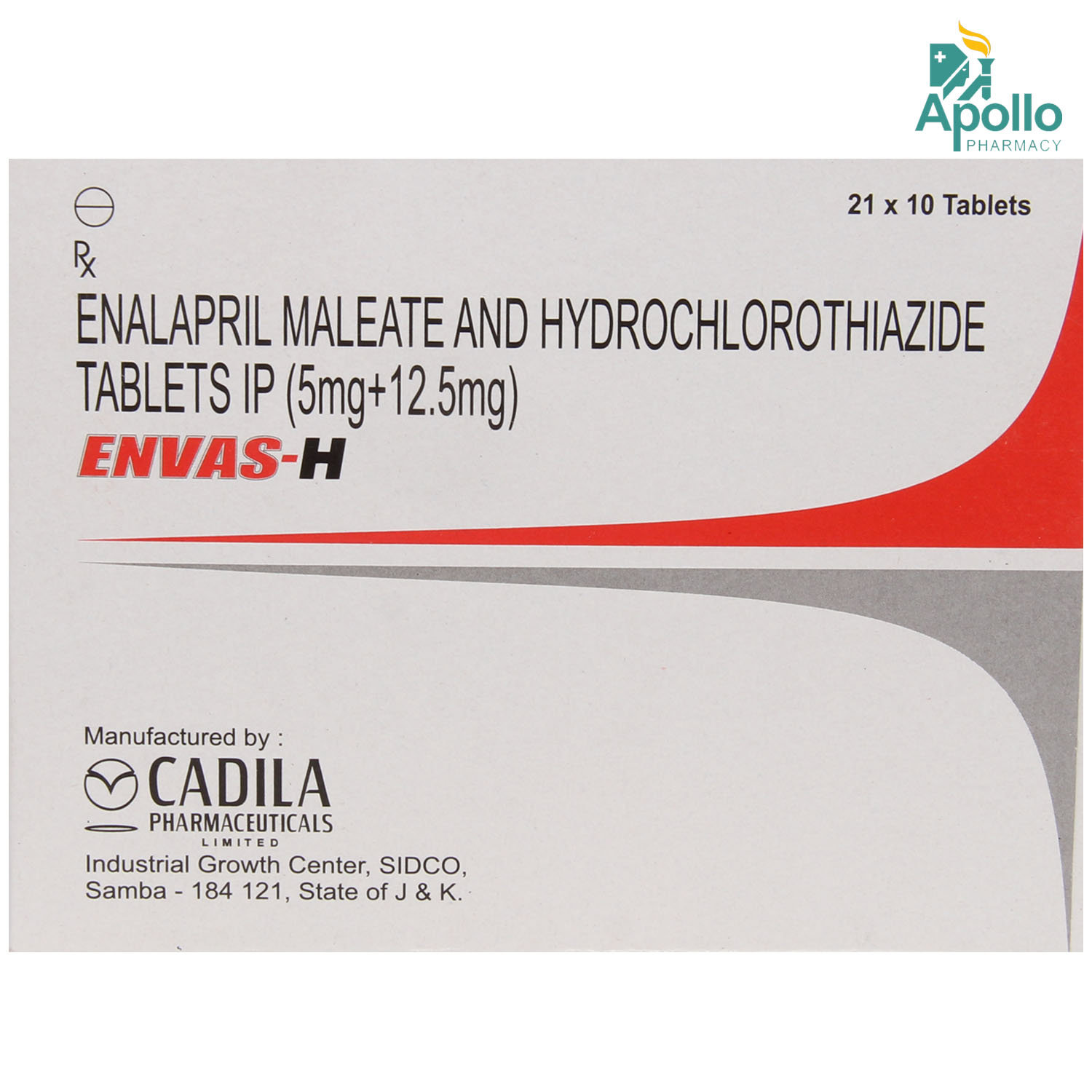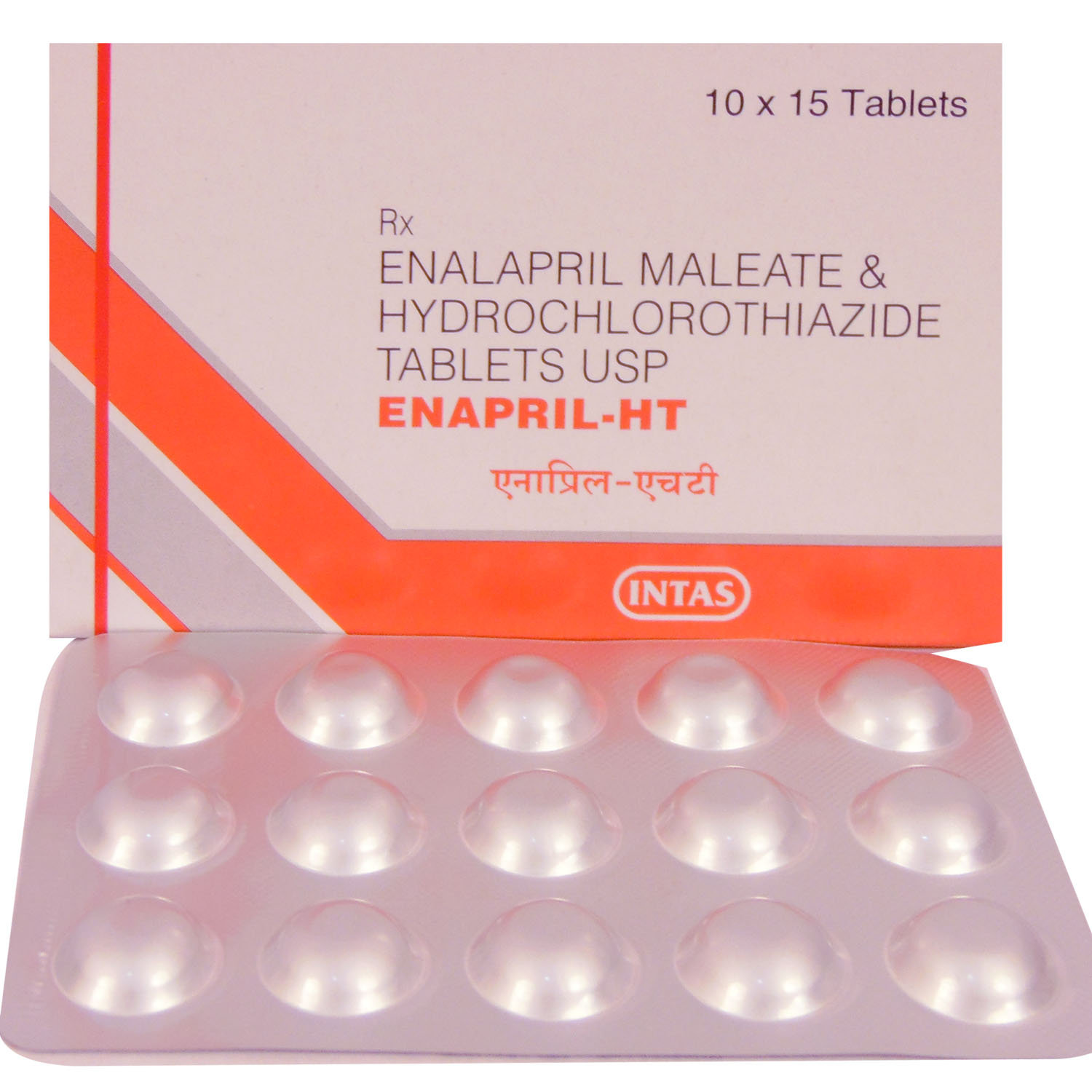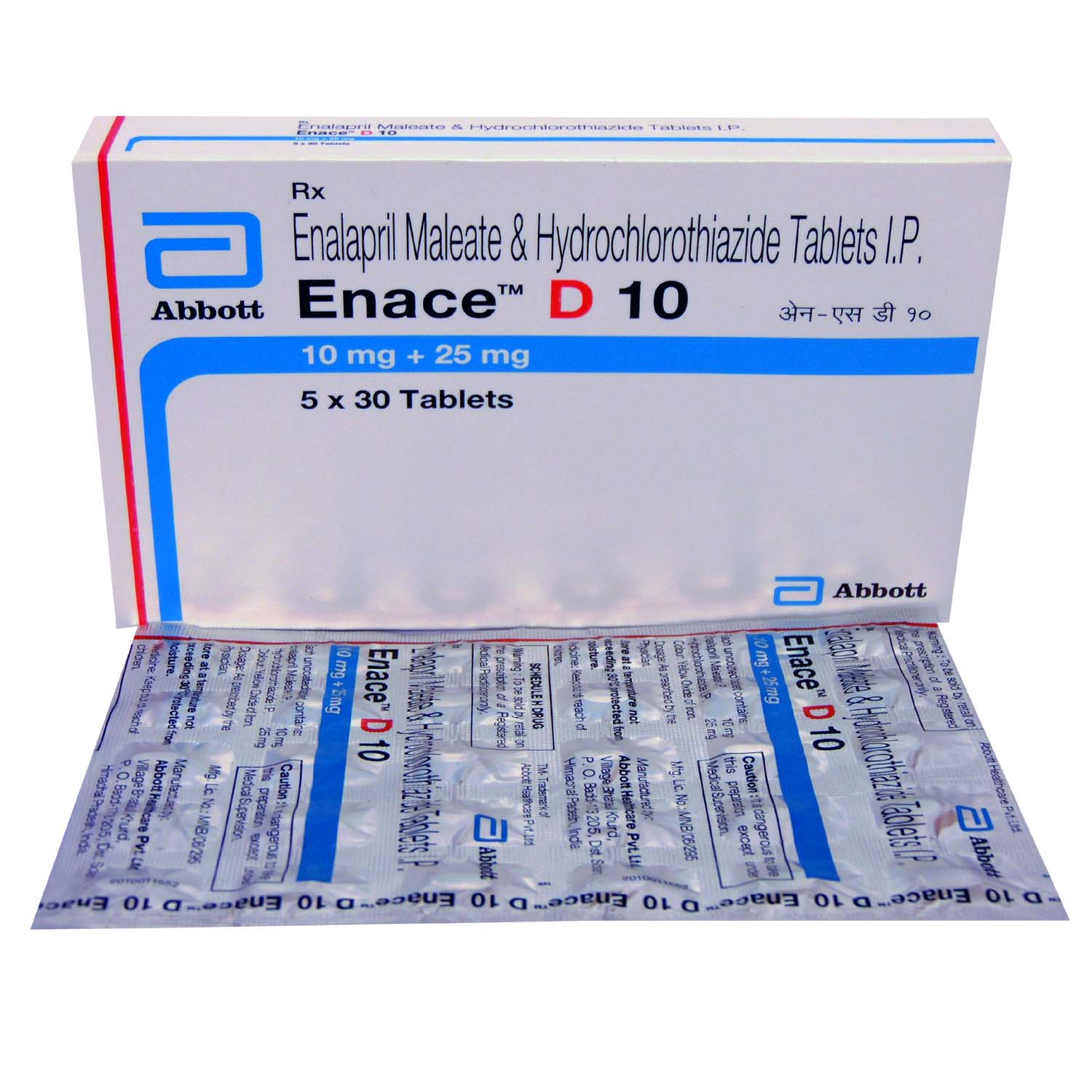Enalapril+hydrochlorothiazide
About Enalapril+hydrochlorothiazide
Enalapril+hydrochlorothiazide belongs to a class of medication called 'anti-hypertensive' primarily used to treat hypertension (high blood pressure). Hypertension is a condition in which the force exerted by the blood against the artery walls becomes so high that it causes health problems, such as heart disease.
Enalapril+hydrochlorothiazide is a combination of two drugs: Enalapril (angiotensin-converting enzyme inhibitor) and Hydrochlorothiazide (diuretic). Enalapril belongs to the class angiotensin-converting enzyme (ACE) inhibitors that work by blocking an angiotensin-converting enzyme which decreases the production of angiotensin II in the body that causes constriction and narrowing of blood vessels leading to high blood pressure. Thereby, it widens and relaxes blood vessels. Hydrochlorothiazide belongs to diuretics (water tablets) that work by increasing the removal of excess water and certain salts such as sodium and potassium from the blood. This removal of water from blood reduces the fluid volume circulating through blood vessels. Thus, together they lower high blood pressure.
Take Enalapril+hydrochlorothiazide as prescribed. Your doctor will advise you on how often you take your tablets based on your medical condition. In some cases, you may experience dizziness, weakness, blurred vision, nausea, headache, orthostatic hypotension (low blood pressure when standing up from sitting or lying position), high cholesterol or uric acid levels, electrolyte imbalance, diarrhoea, chest pain, fast heartbeat, changes in taste or stomach pain. Most of these side effects of Enalapril+hydrochlorothiazide do not require medical attention and gradually resolve over time. However, if the side effects persist, please consult your doctor.
Enalapril+hydrochlorothiazide is not recommended for pregnant women, especially in second and third trimesters as it may cause serious harm to the baby. Therefore, pregnant or breastfeeding women are advised to consult a doctor before taking Enalapril+hydrochlorothiazide. Avoid potassium supplements with Enalapril+hydrochlorothiazide as it may lead to high potassium levels in the blood. If you have asthma, diabetes, low blood pressure, difficulty in urination, gout, blood disorders, systemic lupus erythematosus (an autoimmune disease), scleroderma (hardening and tightening of skin), cerebrovascular disease (a condition affecting blood flow to the brain), have a history of angioedema (swelling under the skin) or skin cancer, kidney, liver or heart problems inform your doctor before taking Enalapril+hydrochlorothiazide.
Uses of Enalapril+hydrochlorothiazide
Medicinal Benefits
Enalapril+hydrochlorothiazide is a combination of two drugs, namely: Enalapril and Hydrochlorothiazide. Enalapril belongs to the class angiotensin-converting enzyme (ACE) inhibitors that work by blocking an angiotensin-converting enzyme which decreases the production of angiotensin II in the body causes constriction and narrowing of blood vessels leading to high blood pressure. Thereby, it widens and relaxes blood vessels. Hydrochlorothiazide is a diuretic (water tablet) that increases the removal of excess water and certain salts such as sodium and potassium from the blood. This removal of water from blood reduces the fluid volume circulating through blood vessels. Thus, together they lower high blood pressure.
Directions for Use
Storage
Side Effects of Enalapril+hydrochlorothiazide
- Dizziness
- Weakness
- Blurred vision
- Nausea
- Headache
- Orthostatic hypotension (low blood pressure when standing up from lying or sitting position)
- High cholesterol or uric acid levels
- Electrolyte imbalance
- Diarrhoea
- Chest pain
- Fast heartbeat
- Changes in taste
- Stomach pain
Drug Warnings
If you are known to be allergic to Enalapril+hydrochlorothiazide or any other medicines, please tell your doctor. Enalapril+hydrochlorothiazide is not recommended for pregnant women, especially in second and third trimesters as it may cause serious harm to the baby. Therefore, pregnant or breastfeeding women are advised to consult a doctor before taking Enalapril+hydrochlorothiazide. It is advised to complete the full course of medication and do not suddenly stop taking Enalapril+hydrochlorothiazide as it may cause recurring symptoms or worsen the condition. Avoid potassium supplements with Enalapril+hydrochlorothiazide as it may lead to high potassium levels in the blood. If you are about to under any surgery, receive anesthetics, LDL apheresis treatment (cholesterol removal from blood using a machine), or desensitization treatment, inform your doctor that you are taking Enalapril+hydrochlorothiazide. If you have asthma, diabetes, low blood pressure, difficulty in urination, gout, blood disorders, systemic lupus erythematosus (an autoimmune disease), scleroderma (hardening and tightening of skin), cerebrovascular disease (a condition affecting blood flow to the brain), have a history of angioedema (swelling under the skin) or skin cancer, kidney, liver or heart problems inform your doctor before taking Enalapril+hydrochlorothiazide.
Drug Interactions
Drug-Drug Interaction: Enalapril+hydrochlorothiazide may have interaction with pain killers (aspirin), antidepressants (duloxetine, fluoxetine, sertraline), water tablets (hydrochlorothiazide, furosemide), anticonvulsants (pregabalin), medicines used to lower high blood pressure (metoprolol, amlodipine), bronchodilators (albuterol, salmeterol), vitamin (cholecalciferol).
Drug- Food Interaction: Enalapril+hydrochlorothiazide may interact with potassium salt substitutes and potassium supplements resulting in hyperkalemia (high levels of potassium in the blood) and may cause severe adverse effects such as irregular heartbeat, muscle paralysis, and kidney failure. Also, avoid intake of potassium-rich foods such as coconut water, bananas, and broccoli.
Drug-Disease Interaction: If you have asthma, diabetes, low blood pressure, difficulty in urination, gout, blood disorders, systemic lupus erythematosus (an autoimmune disease), scleroderma (hardening and tightening of skin), cerebrovascular disease (a condition affecting blood flow to the brain), have a history of angioedema (swelling under the skin) or skin cancer, kidney, liver or heart problems inform your doctor before taking Enalapril+hydrochlorothiazide.
Drug-Drug Interactions Checker List:
Safety Advice

Alcohol
unsafeAvoid alcohol consumption with Enalapril+hydrochlorothiazide as it may increase the risk of low blood pressure and cause adverse effects such as dizziness, fainting, light-headedness or headache.

Pregnancy
unsafePlease consult a doctor if you are pregnant. Enalapril+hydrochlorothiazide is not recommended for pregnant women, especially in the second and third trimesters as it may cause birth defects or serious harm to the baby.

Breast Feeding
unsafeEnalapril+hydrochlorothiazide may be excreted in human milk. Therefore, Enalapril+hydrochlorothiazide is not recommended for breastfeeding mothers as it may be unsafe for the baby. However, please consult a doctor.

Driving
cautionEnalapril+hydrochlorothiazide may cause dizziness or tiredness in some people. Therefore, avoid driving if you feel dizzy or tired after taking Enalapril+hydrochlorothiazide.

Liver
cautionEnalapril+hydrochlorothiazide should be given with caution, especially if you have a history of Liver diseases/conditions. The dose may be adjusted by your doctor as required. Avoid taking Enalapril+hydrochlorothiazide if you have severe liver problems.

Kidney
cautionEnalapril+hydrochlorothiazide should be given with caution, especially if you have a history of Kidney diseases/conditions. The dose may be adjusted by your doctor as required. Avoid taking Enalapril+hydrochlorothiazide if you have severe kidney problems.

Children
unsafeIt is not recommended for children as the safety and effectiveness were not established.
Habit Forming
Diet & Lifestyle Advise
- Maintain a low salt diet and minimize eating processed foods as they contain more sodium. Try to replace salt with spices or herbs to add flavor to the food.
- Do regular exercise such as cycling, walking, jogging, dancing, or swimming for a minimum of 30 minutes per day.
- Chronic stress may also cause high blood pressure. Therefore, avoid stress triggers and make time for yourself to relax and do activities that you enjoy.
- Maintain a diet that is rich in vegetables, fruits, whole grains, and low-fat dairy products.
- Try to include heart-healthy omega 3 fatty acid-containing foods in your daily diet. You can also use low-fat cooking oil like olive oil, soybean oil, canola oil, and coconut oil which may help in lowering high blood pressure.
- Quit smoking and avoid the consumption of alcohol.
Special Advise
- Regular monitoring of blood pressure, kidney functioning, and amount of electrolytes such as sodium, potassium, magnesium, creatinine, and liver enzyme levels are recommended while taking Enalapril+hydrochlorothiazide.
- If you are about to take an anti-doping test, please inform your doctor that you are taking Enalapril+hydrochlorothiazide as it may give a positive result.
- Low salt diet and regular exercise are recommended along with Enalapril+hydrochlorothiazide for effective results.
Patients Concern
Disease/Condition Glossary
Hypertension: Blood pressure is the measurement of the heart's force to pump blood to all parts of the body. Hypertension is a chronic condition in which blood pressure is too high. This condition can lead to hardened arteries (blood vessels), decreasing the blood and oxygen flow to the heart. Raised blood pressure can cause chest pain (angina) and heart attack (when blood supply to the heart is blocked). Additionally, high blood pressure also causes brain damage (stroke) and kidney failure. High blood pressure can be diagnosed with the help of a blood pressure monitor or sphygmomanometer. Systolic pressure is the pressure when the heart pumps blood out. On the other hand, diastolic pressure is the pressure when your heart is at the resting stage between heartbeats. If your blood pressure is 140/90 mm of Hg, it means the systolic pressure is 140 mm of Hg and, diastolic pressure is 90 mm of Hg. Normal blood pressure lies in between 90/60 mm of Hg and 120/80 mm of Hg. If the blood pressure is 140/90 mmHg or greater, it is considered high blood pressure.
FAQs
Enalapril+hydrochlorothiazide contains Enalapril and Hydrochlorothiazide. Enalapril belongs to the class angiotensin-converting enzyme (ACE) inhibitors that work by blocking an angiotensin-converting enzyme which decreases the production of angiotensin II in the body that causes constriction and narrowing of blood vessels leading to high blood pressure. Thereby, it widens and relaxes blood vessels. Hydrochlorothiazide is a diuretic (water tablet) that increases the removal of excess water and certain salts such as sodium and potassium from the blood. This removal of water from blood reduces the fluid volume circulating through blood vessels. Thus, together they lower high blood pressure.
You are not recommended to take furosemide with Enalapril+hydrochlorothiazide as co-administration of these two medicines may increase the risk of low blood pressure. However, if you experience dizziness, reduced heart rate, headache or fainting, please consult a doctor immediately. If you are supposed to use these medicines together, you are advised to contact your doctor so that the dose may be adjusted to use safely.
It is advised to inform your doctor if you have had skin cancer or develop an unexpected skin lesion as hydrochlorothiazide in Enalapril+hydrochlorothiazide may increase the risk of certain types of skin and lip cancer especially when taken in high doses for a long period. Therefore, it is recommended to protect the skin from UV rays and sun exposure while taking Enalapril+hydrochlorothiazide.
No, you are not recommended to take potassium supplements with Enalapril+hydrochlorothiazide as it may increase the levels of potassium in the blood (hyperkalaemia). However, please consult a doctor before taking other medicines with Enalapril+hydrochlorothiazide.
If you have any kidney problems, it is advised to inform your doctor before taking Enalapril+hydrochlorothiazide as Enalapril+hydrochlorothiazide may worsen kidney functioning if there is any existing kidney problem. However, if you experience unexplained weight gain, swelling in feet, ankles or hands, please consult your doctor immediately.
You are not recommended to take more than the prescribed dose of Enalapril+hydrochlorothiazide as it may cause Enalapril+hydrochlorothiazide overdose resulting in symptoms such as low blood pressure, cough, nausea, dizziness, cramps, drowsiness, fast or slow heartbeat, anxiety, increased urination or difficulty in urination. However, if you experience any of these symptoms while taking Enalapril+hydrochlorothiazide, please consult a doctor immediately.






